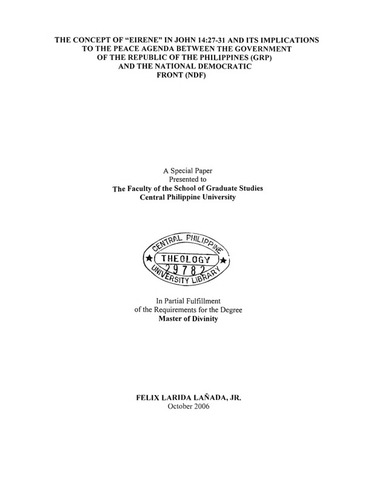Показать сокращенную информацию
The concept of “Eirene” in John 14:27-31 and its implications to the peace agenda between the Government of the Republic of the Philippines (GRP) and the National Democratic Front (NDF)
| dc.contributor.adviser | Pagara, Bernabe C. | |
| dc.contributor.author | Lañada, Felix L. Jr. | |
| dc.date.accessioned | 2021-04-07T05:18:12Z | |
| dc.date.available | 2021-04-07T05:18:12Z | |
| dc.date.issued | 2006 | |
| dc.identifier.citation | Lañada, F. L., JR. (2006). The concept of “Eirene” in John 14:27-31 and its implications to the peace agenda between the Government of the Republic of the Philippines (GRP) and the National Democratic Front (NDF) (Unpublished Master's special paper). Central Philippine University, Jaro, Iloilo City. | en_US |
| dc.identifier.uri | https://hdl.handle.net/20.500.12852/726 | |
| dc.description | Abstract only | en_US |
| dc.description.abstract | This special paper deals with the topic, “The Concept of Eirene in John 14:27- 31 and Its Implications to the Peace Agenda Between the Government of the Republic of the Philippines (GRP) and National Democratic Front (NDF).” This study is a historical and biblical study of the concept of “peace” in the Gospel of John. It also provides the biblical meaning of “peace.” The aim of the first major section of this special paper is to find out the biblical meaning of Eirene in the Gospel of John by applying the principles of exegesis. This section consists of three (3) major divisions: The concept of “peace” in the Old and New Testaments; An exegetical study of John 14: 27-31; The summary of the theological understanding of Eirene in John. The second major section deals with the brief background and draft programs of NDF. Here, the writer includes the peace agenda of GRP and NDF. The third major section presents an analysis of the peace agenda. The writer highlights the theological understanding of Eirene in the light of the peace agenda between the GRP and NDF. In the search of these two conflicting parties to build an enduring and lasting peace through an exchange of peace agenda, the writer aims at analyzing whether there is an element of the theological understanding of Eirene in the peace agenda. If ever there is an element of the theological understanding of Eirene in the peace agenda, is it sufficient to establish an enduring and lasting peace? In this major section, the writer also enumerates the theological implications of the theological understanding of Eirene in John to the peace agenda between the GRP and NDF. The last major section includes the conclusion and recommendations of the writer. In the conclusion, the writer highlights the important findings in this study. In the recommendations, the writer recommends two (2) important concepts that would ensure an enduring and lasting peace between the GRP and NDF. The concepts of “reconciliation” and “love” are underlying principles, which must be emphasized by the two conflicting parties for their future peace agenda if they desire to establish an enduring and lasting peace. | en_US |
| dc.format.extent | vi, 72 leaves | en_US |
| dc.language.iso | en | en_US |
| dc.rights | Attribution-NonCommercial-NoDerivs 3.0 Philippines | * |
| dc.rights.uri | http://creativecommons.org/licenses/by-nc-nd/3.0/ph/ | * |
| dc.subject.ddc | TheoLib Thesis 200.72 L22 | en_US |
| dc.subject.lcsh | Peace | en_US |
| dc.subject.lcsh | Bible. John | en_US |
| dc.subject.lcsh | Bible. John--Commentaries | en_US |
| dc.subject.lcsh | Philippines | en_US |
| dc.subject.lcsh | Eirēnē (The Greek word) | en_US |
| dc.subject.lcsh | Peace-building | en_US |
| dc.title | The concept of “Eirene” in John 14:27-31 and its implications to the peace agenda between the Government of the Republic of the Philippines (GRP) and the National Democratic Front (NDF) | en_US |
| dc.type | Special paper | en_US |
| dc.description.bibliographicalreferences | Includes bibliographical references | en_US |
| dc.contributor.chair | David, Fely P. | |
| dc.contributor.department | School of Graduate Studies | en_US |
| dc.description.degree | Master of Divinity | en_US |
| local.subject | National Democratic Front (NDF) | en_US |
Файлы в этом документе
Данный элемент включен в следующие коллекции
-
Master of Divinity [35]



